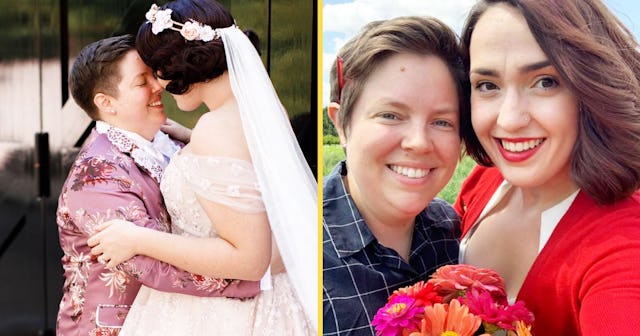When It Comes To Infertility And Insurance, The Odds Are Against LGBTQ Couples

To date, my wife and I have been on our fertility journey for a little over one month. In that month, I have been poked and prodded. My blood has been drawn, and dye has been injected into my uterus. I have been x-rayed, and received a booster of a surprisingly painful vaccine because my immunity to a certain disease had waned over time. I have spent hundreds on ovulation predictor kits to track my cycle for the past six months, and have kept meticulous records. We have been forced to meet with a psychologist for an “intended parent evaluation,” and to pay for that visit out of pocket because it was not covered by insurance. We have not inseminated one single solitary time, and our current costs stand somewhere around $5,000 out of pocket.
Courtesy of Jessica Reyman
You may look at that number and be surprised to find out that we are actually insured, and that our coverage is better than most. Five thousand dollars in bills for a baby that we want desperately, and we haven’t even taken our first real shot at actually making him or her.
Courtesy of Jessica Reyman
I am writing this raw, because today, after discovering that $3,500 of that $5,000 has been denied by our insurance company despite our supposedly excellent infertility benefits, I was told by our insurance company that the only way that we can actually utilize those benefits is if we can prove that we have been unsuccessfully trying to get pregnant for a year. That’s the benchmark, the across-the-board rule for every woman under the age of 35, no matter their sexuality. 12 months of unsuccessful trying, either by heterosexual intercourse or 12 failed donor IUI attempts.
Courtesy of Jessica Reyman
Make no mistake, infertility is devastating. Wanting a child and struggling to conceive that child is heartbreaking. It is the stuff of nightmares, and I wouldn’t wish it on my worst enemy. 12 months of unsuccessful heterosexual intercourse is frustrating—beyond frustrating—for so many couples. But it’s free, for the most part, and for most people.
12 months of unsuccessful IUI treatments for my wife and I could top out at close to forty thousand dollars, and this is not hyperbole. In order to meet the requirements for the benefits that my wife works hard and pays into, we would have to nearly bankrupt ourselves.
Courtesy of Jessica Reyman
I have been crying all day. You see, I have been a nanny for ten years. For the last decade, I have spent my days, weeks, sometimes overnights, nurturing and loving other people’s babies. I have rocked them to sleep, I have kissed their boo-boos, I have formed bonds with both children and parents that to this day remain unbreakable. I have been honored beyond words to extend my family-by-choice to include some of the most incredible little people I have ever known, and being able to spend my days with them has brought me an immeasurable amount of joy. But every story has its end, and after ten years of pouring my entire heart into loving other people’s children, I’m yearning to have my own.
Courtesy of Jessica Reyman
It’s darkly funny, really. A macabre kind of humor that only makes you chuckle once the depression kicks in, and the world grows a little bit darker. I’m 29 years old. Healthy. Capable. Married. Financially stable. We are ready and excited to bring a baby of our own into this world, but unable to do so without diving into debt because our family is being held to the same standards as heterosexual couples. Despite the marked difference in our situations. Despite the fact that most heterosexual couples have sperm-on-demand, and don’t have to spend thousands (literal thousands!) at a cryobank.
We wanted to do it “right.” We did our research and found a reputable doctor. I took notes in an actual notebook at our consultation, and have been religiously taking prenatal vitamins for six months. We searched for a well-respected cryobank, shuddered at the $800-$1100 per-vial price tag, but figured that we could lean on our HSA to help with some of the expenses. Certainly, we could use a known donor, but we’d still be responsible for thousands of dollars in lawyer fees and medical testing on that donor to meet FDA standards. We did all this with the knowledge that our supposedly-excellent fertility coverage would help with a bulk of the expenses, and that we would be completely okay. Until suddenly, we weren’t okay.
Courtesy of Jessica Reyman
I’m not okay. I am raging. I am heartbroken. The practice of insurance companies holding same-sex couples to the same standards as heterosexual couples is nothing less than discriminatory. Our situations at their core are so very different, and to apply the same rules across the board is a false equivalency. To offer services under the guise that they are for “all couples,” knowing full well the hefty price tag that crushes one of those groups, is sickening.
Our system is broken, and I am breaking along with it.
This article was originally published on